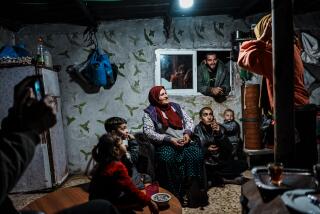Iraq Won’t Let Americans Out, State Dept. Says
- Share via
WASHINGTON — Thirty-nine Americans are being detained in a Baghdad hotel and 500 others have been blocked from leaving Iraq since Saddam Hussein’s regime invaded Kuwait last week, the State Department reported Tuesday.
Although a few Americans have managed to get out of occupied Kuwait, about 3,500 U.S. citizens are unable to depart because the main airport is closed and roads are blocked, department officials added.
“We want Americans and foreigners to have safe passage out of Kuwait and out of Iraq,” Margaret Tutwiler, chief spokeswoman for the State Department, said at a news briefing.
But she said it would be “premature” to classify the Americans under hotel arrest or those who cannot depart the two countries as “hostages” because discussions are under way between U.S. and Iraqi officials over their status.
So far, she said, Iraq has not provided an adequate explanation for its refusal to allow the Americans to leave. She added that the Iraqi ambassador to the United States has been “forcibly” reminded that Washington holds Iraq responsible for the safety of Americans in the country.
In Amman, the government of Jordan announced Tuesday that U.S. officials have asked it to help bring about a dozen “non-essential” diplomatic staff members and their families out of Iraq as tension mounts between Washington and Baghdad.
Jordanian Information Minister Ibrahim Ezzedin said without elaborating: “Jordan confirms the request of the United States Embassy in Amman to help evacuate Americans from Iraq to Jordan. The Americans are non-essential diplomats and their dependents.”
Exactly what Jordan will do to help the Americans was not made clear, although there were reports that the government is willing to let thousands of foreigners take temporary refuge in their territory if they can get out of Iraq. It takes about 10 hours to drive from Baghdad to Amman.
A commercial jet from Baghdad arrived in Amman on Tuesday with 73 foreigners on board, including 1 American. In television interviews, several said they had been treated well upon leaving Iraq.
U.S. Embassy officials in Amman were silent on the Jordanian statement, although diplomatic sources said that a “drawdown” of staff at the embassy in Baghdad was planned in the days just ahead. The government of Iraqi President Saddam Hussein has given permission for an evacuation, they said.
State Department officials, who asked not to be identified so they could speak more freely, said Iraq was giving “mixed signals” about whether U.S. citizens would be permitted to leave by road or by air. It was not clear when they would be allowed to go, the officials said.
Diplomats in Amman leave little doubt about their fears. “It does not take a lot of imagination to see how unfriendly crowds in Baghdad could be a possible danger to American citizens,” one said.
The 39 Americans detained in Baghdad were housed at the five-star Al Rasheed Oberoi hotel in the central part of the city, according to the State Department, and were reported by U.S. diplomats who visited some of them to be in “good shape.”
Of the total, 11 are oil field workers detained immediately after Iraqi forces stormed across the Kuwaiti border last Thursday. Twenty-five were rounded up in hotels in the capital and taken by bus to Baghdad; the remaining three people were not identified further.
The hotel, owned by the Iraqi government, has spacious grounds surrounded by a high fence. A reporter who has visited Baghdad said there are several restaurants in the compound, popular with foreigners, including two that specialize in Chinese and Mexican food.
“Our understanding is that foreigners in hotels in Baghdad who have been brought from Kuwait are not being allowed to leave the hotels at this point, although they are allowed the full use of the hotel facilities,” Tutwiler said.
“We will continue to work for the expeditious departure of all Americans” from Iraq as well as from Kuwait, Tutwiler said. “We obviously still hope that the Baghdad airport will be open to all who wish to leave.”
The departure of American diplomats is characterized as voluntary; other Americans have been advised to leave if they can. Jordan reported that the border with Iraq was open Tuesday but that few foreigners crossed.
Meanwhile, a special State Department task force served as a go-between for families of Americans detained in Iraq and Kuwait, handling 10,000 calls since the invasion began and staying in round-the-clock touch with U.S. embassies in the two nations on developments in the region.
In recent months, diplomats say, there has been a rise in anti-American sentiment throughout the Arab world, and these feelings have been fueled by developments in Israel. The influx of Soviet immigrants to the Jewish state is viewed by many Arabs as a step toward displacing Palestinians in the Israeli-occupied West Bank and Gaza Strip.
A U.S. veto of a United Nations resolution to send a team to investigate Israel’s treatment of Palestinians has added fuel. And Arab leaders were displeased when the Bush Administration, after 18 months, broke off its dialogue with the Palestine Liberation Organization last May. The rupture followed an abortive terrorist raid on Israel.
The rise of Islamic fundamentalism in several countries, with radicals viewing the United States as an enemy of Islam, also contributes to the anti-American feeling.
Jordan’s announcement of aid to Americans appeared to be an effort by King Hussein to show that, despite disagreements with Washington over policy toward Iraq, he remains a friend. Bush has expressed disappointment at the reluctance of King Hussein to condemn Iraq’s invasion of Kuwait.
Eaton reported from Washington and Williams reported from Amman, Jordan.
More to Read
Sign up for Essential California
The most important California stories and recommendations in your inbox every morning.
You may occasionally receive promotional content from the Los Angeles Times.













